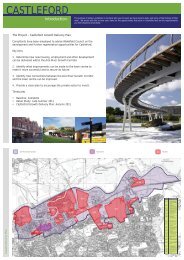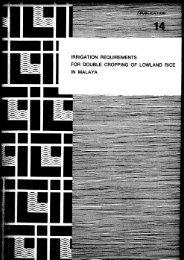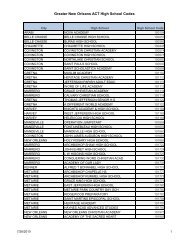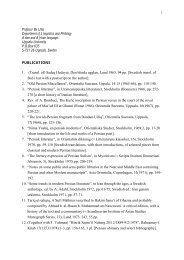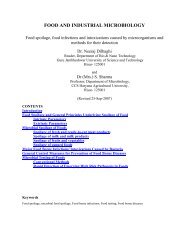On the Future of Indigenous Traditions - Munin
On the Future of Indigenous Traditions - Munin
On the Future of Indigenous Traditions - Munin
Create successful ePaper yourself
Turn your PDF publications into a flip-book with our unique Google optimized e-Paper software.
With this position if we look at <strong>the</strong> case <strong>of</strong> Adivasis in Jharkhand it is <strong>the</strong> power<br />
<strong>the</strong>ory <strong>of</strong> politics (see section 3.1) that is dominating. The state as within <strong>the</strong> structure<br />
<strong>of</strong> State is playing a role <strong>of</strong> <strong>the</strong> ‘legal organisation’ in making and implementing state<br />
policies: With <strong>the</strong> following fact we can very well make out why <strong>the</strong> Adivasis need to<br />
have <strong>the</strong>ir political association (<strong>the</strong> rights <strong>the</strong>ory <strong>of</strong> politics) which is inclusive <strong>of</strong><br />
representation through <strong>the</strong>ir customary system being central for <strong>the</strong>ir self-governance.<br />
Taking <strong>the</strong> facts into this frame for analysis, firstly, it is only in 2000 that Jharkhand<br />
was made to be a new political state after <strong>the</strong> country’s independence in 1947. The<br />
demography <strong>of</strong> Jharkhand had drastically changed within <strong>the</strong> span <strong>of</strong> five decades<br />
already. <strong>On</strong>e would say beyond any ‘well-wishers’ comprehension, that this occurred<br />
because this region is not only a rich mineral resource area, but also an area where<br />
mega industrial estates were founded soon after <strong>the</strong> independence <strong>of</strong> <strong>the</strong> country,<br />
opening job opportunities for people from neighbouring states. The region was rich in<br />
natural resource, but <strong>the</strong> people were ‘backward’, ‘illiterate’ and ‘poor’. Therefore,<br />
‘technical’, ‘literate’ people had to be brought in to run <strong>the</strong> industrial estates;<br />
infrastructures had to be built, urbanization and expansion <strong>of</strong> towns to cities, Bokaro,<br />
Dhanbad, Tatanagar etc. for example was in progress 114 . Jharkhand was a part <strong>of</strong><br />
Bihar for all <strong>the</strong>se years, where not only <strong>the</strong> key positions but all <strong>the</strong> jobs from top to<br />
bottom were occupied by Biharies, Bangalis and o<strong>the</strong>rs, except for <strong>the</strong> reserved seats<br />
in jobs. Patna, was <strong>the</strong> capital <strong>of</strong> Bihar being <strong>the</strong> headquarters <strong>of</strong> all <strong>the</strong> state’s affairs<br />
red-tapirs, nepotism, and bribery was in every level <strong>of</strong> state affairs. Since Patna was<br />
socially and culturally different, this situation in many ways created a north south<br />
divide. The South had all <strong>the</strong> resources and ‘opportunities’, but a weak political<br />
representation, with all <strong>of</strong>fice headquarters in <strong>the</strong> north. South Bihar was thus “given”<br />
to be exploited to <strong>the</strong> guise that ‘we are all Indians’ dominated <strong>the</strong> notion <strong>of</strong> national<br />
identity, and <strong>the</strong> Adivasi thus had to be affiliated to one national identity with no<br />
voice <strong>of</strong> <strong>the</strong>ir own. Therefore, we can take Brass’s <strong>the</strong>oretical frame <strong>of</strong> ‘<strong>the</strong> struggle<br />
within <strong>the</strong> ethnic group’ to interpret <strong>the</strong> Bihar / Jharkhand context. While it can not be<br />
taken word to word, however, <strong>the</strong> constructivist interpretation <strong>of</strong> <strong>the</strong> ethnic group(s)<br />
identity fits <strong>the</strong> first set <strong>of</strong> struggle quiet well.<br />
114 Government is <strong>of</strong>ten in a hurry to industrialise <strong>the</strong> area and <strong>the</strong> country without giving a chance and<br />
opportunity to get <strong>the</strong> required education for running <strong>the</strong> industries. This policy has led <strong>the</strong> Adivasis to<br />
die an un-natural death.<br />
74



